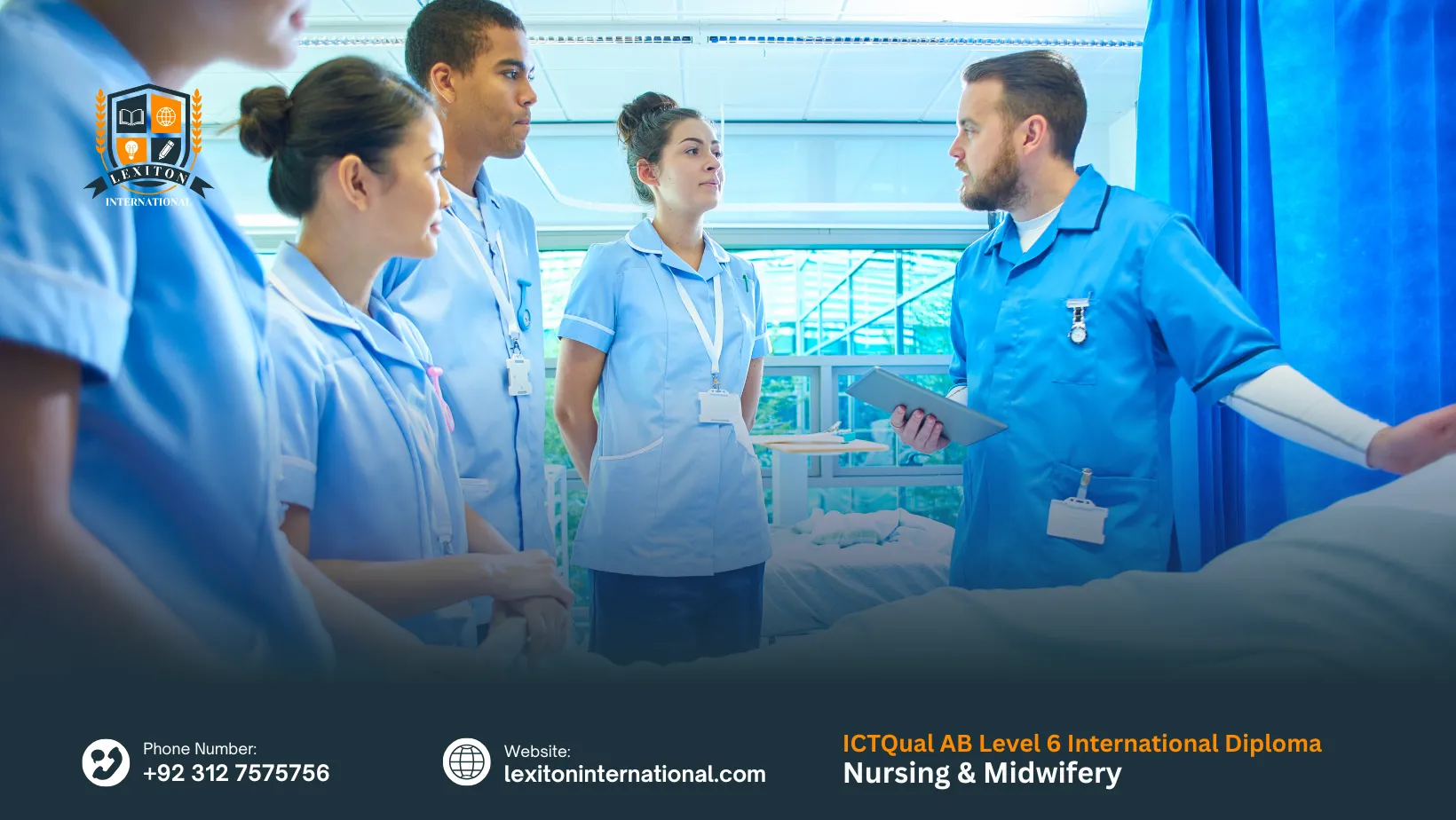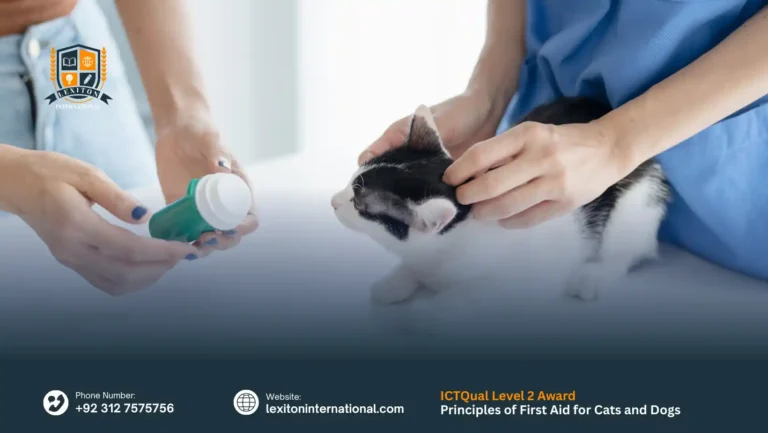The ICTQual AB Level 6 International Diploma in Nursing & Midwifery is a comprehensive three-year, 360-credit program designed to prepare learners for advanced roles in healthcare. This internationally recognized qualification equips students with the clinical knowledge, practical skills, and ethical understanding required to deliver high-quality nursing and midwifery care across diverse healthcare settings. The course is ideal for individuals seeking to build a career in hospitals, community health, maternal care, and global health systems.
The curriculum integrates theoretical foundations with hands-on training in areas such as patient care, maternal and neonatal health, pharmacology, anatomy, and emergency response. Learners develop competencies in clinical decision-making, health promotion, and evidence-based practice, while also gaining exposure to international healthcare standards. Through simulations, case studies, and supervised clinical placements, students are prepared to meet the evolving demands of modern healthcare environments.
Graduates of this diploma are well-positioned to pursue careers as registered nurses, midwives, or healthcare coordinators in both public and private sectors. The qualification also serves as a pathway to further academic progression, including bachelor’s and master’s degrees in nursing, public health, or healthcare management. With its global relevance and emphasis on professional development, the ICTQual AB Level 6 Diploma empowers learners to make a meaningful impact in patient care and maternal health worldwide.
The ICTQual AB Level 6 International Diploma in Nursing & Midwifery is designed for learners who wish to pursue advanced clinical knowledge and professional competence in nursing and maternal healthcare. To ensure participants gain the maximum benefit from this three-year, 360-credit programme, certain academic, professional, and language requirements are recommended.
- Age Requirement: Learners should ideally be 18 years or older, as the course involves advanced medical concepts, patient care responsibilities, and ethical decision-making in clinical settings.
- Educational Background: Applicants should have a Level 5 qualification or equivalent in nursing, midwifery, or allied health sciences. Candidates with a diploma or bachelor’s degree in general nursing, community health, or paramedical studies are also eligible.
- Work Experience: Relevant experience in clinical practice, hospital care, or community health services is advantageous but not mandatory. Practical exposure to patient care, maternal health, or emergency response can enhance understanding of course content.
- English Language Proficiency: Learners should have a good command of spoken and written English to comprehend medical terminology, interact with patients and healthcare teams, and complete assessments effectively.
- Professional Interest in Nursing & Midwifery: Participants should have a strong interest in pursuing a career in nursing, maternal care, or public health. A passion for patient welfare, ethical practice, and lifelong learning is essential.
- Commitment to Long-Term Study: As this is a three-year programme, candidates should be prepared for a structured learning schedule that includes theoretical modules, clinical placements, and continuous assessments aligned with international healthcare standards.
This diploma is ideal for individuals who aspire to become compassionate, skilled, and globally competent nursing and midwifery professionals.
Mandatory Units
This qualification, the ICTQual AB Level 6 International Diploma in Nursing & Midwifery 360 Credits – Three Years, consists of 36 mandatory units.
Year 1: Foundational Knowledge
Year 2: Intermediate Proficiency
Year 3: Advanced Specialization and Application
Learning Outcomes for the Level 6 International Diploma in Nursing & Midwifery 360 Credits – Three Years:
Year 1: Foundational Knowledge
By the end of Year 1, learners will be able to:
Introduction to Nursing and Midwifery Practice
- Explain the roles and responsibilities of nurses and midwives in healthcare settings.
- Apply foundational nursing principles in basic patient care.
- Demonstrate professional conduct aligned with healthcare standards.
Fundamentals of Human Anatomy and Physiology
- Describe the structure and function of major human body systems.
- Relate anatomical and physiological knowledge to patient care.
- Recognise normal versus abnormal body functions relevant to nursing.
Principles of Microbiology and Infection Control
- Identify common pathogens and their modes of transmission.
- Apply infection prevention and control measures in clinical practice.
- Evaluate the impact of microbiological knowledge on patient safety.
Foundations of Pharmacology and Medication Safety
- Explain the principles of pharmacology and drug administration.
- Demonstrate safe medication handling and administration practices.
- Monitor and evaluate patient responses to medications.
Professional Ethics and Legal Frameworks in Healthcare
- Apply ethical principles in clinical decision-making.
- Understand healthcare legislation affecting nursing and midwifery practice.
- Maintain confidentiality and professional responsibility in all patient interactions.
Communication Skills for Healthcare Professionals
- Demonstrate effective communication with patients and healthcare teams.
- Apply active listening and empathetic skills in patient care.
- Document patient information accurately and professionally.
Health Promotion and Public Health Basics
- Explain principles of health promotion and disease prevention.
- Apply public health strategies to support community wellbeing.
- Evaluate interventions for effectiveness in promoting health outcomes.
Psychology and Sociology in Healthcare
- Explain the influence of psychological and social factors on patient health.
- Apply basic counselling techniques to support patients.
- Recognise the impact of social determinants on healthcare delivery.
Nutrition, Dietetics, and Patient Wellbeing
- Assess nutritional needs and dietary requirements of patients.
- Apply knowledge of dietetics in patient care planning.
- Promote healthy eating and lifestyle practices for improved wellbeing.
Basic Clinical Skills and Patient Care Techniques
- Perform essential clinical procedures safely and accurately.
- Demonstrate patient handling and care techniques with empathy.
- Apply infection control and safety standards in clinical practice.
First Aid and Emergency Response in Healthcare
- Respond effectively to common medical emergencies.
- Apply first aid procedures in clinical settings.
- Demonstrate critical decision-making in emergency care situations.
Introduction to Research and Evidence-Based Practice
- Explain the importance of evidence-based practice in healthcare.
- Apply basic research methods to clinical questions.
- Evaluate research findings to support nursing and midwifery practice.
Year 2: Intermediate Proficiency
By the end of Year 2, learners will be able to:
Adult Nursing and Clinical Care
- Provide comprehensive nursing care for adult patients.
- Assess and monitor patient conditions using clinical tools.
- Develop care plans addressing patient-specific needs.
Maternal Health and Midwifery Principles
- Apply principles of midwifery in prenatal, labour, and postnatal care.
- Monitor maternal and foetal wellbeing using clinical assessments.
- Support safe childbirth and promote maternal health education.
Child and Adolescent Health Nursing
- Provide age-appropriate care for children and adolescents.
- Assess growth, development, and health status accurately.
- Implement interventions promoting child and adolescent wellbeing.
Mental Health Nursing and Psychiatric Care
- Recognise common mental health disorders and their clinical presentations.
- Apply therapeutic communication and counselling techniques.
- Deliver safe, compassionate mental health care in clinical settings.
Community Health Nursing and Primary Care
- Assess community health needs and resources.
- Plan and deliver primary care interventions for diverse populations.
- Evaluate the impact of community health initiatives on patient outcomes.
Pathophysiology and Clinical Diagnostics
- Explain disease processes and their physiological effects.
- Apply diagnostic reasoning to patient assessment.
- Interpret laboratory and clinical findings to inform care planning.
Advanced Pharmacology and Therapeutics
- Analyse pharmacological principles in specialised clinical contexts.
- Apply safe medication management in complex care scenarios.
- Evaluate therapeutic outcomes and adjust care plans accordingly.
Infection Prevention and Control in Healthcare Settings
- Implement advanced infection control protocols.
- Evaluate effectiveness of hygiene and sterilisation procedures.
- Promote safe practices for patients and healthcare teams.
Health Assessment and Clinical Decision Making
- Conduct comprehensive patient assessments.
- Integrate assessment data to make informed clinical decisions.
- Prioritise care based on patient needs and risk factors.
Nursing Informatics and Digital Healthcare Systems
- Use digital tools for patient record management and reporting.
- Apply informatics to support clinical decision-making.
- Evaluate the benefits and limitations of digital healthcare systems.
Leadership and Teamwork in Healthcare Practice
- Demonstrate effective leadership in clinical teams.
- Apply teamwork strategies to improve patient care.
- Resolve conflicts and promote collaboration within healthcare settings.
Applied Research Methods in Nursing and Midwifery
- Design and implement small-scale research projects.
- Analyse and interpret clinical data using research methods.
- Apply research findings to improve practice outcomes.
Year 3: Advanced Specialization and Application
By the end of Year 3, learners will be able to:
Advanced Adult Nursing and Critical Care
- Provide specialised care for critically ill adult patients.
- Monitor complex patient conditions and respond to emergencies.
- Develop advanced care plans to support recovery and rehabilitation.
Midwifery Practice: Labour, Delivery, and Postnatal Care
- Manage labour and delivery safely and effectively.
- Provide postnatal care and support for mothers and newborns.
- Apply evidence-based interventions to promote maternal and neonatal health.
Paediatric and Neonatal Nursing
- Deliver specialised care for neonates and children.
- Assess developmental milestones and monitor growth and health.
- Implement interventions to support paediatric recovery and wellbeing.
Geriatric Nursing and Palliative Care
- Assess and manage complex needs of elderly patients.
- Provide compassionate end-of-life and palliative care.
- Promote quality of life through tailored care plans.
Advanced Mental Health and Counselling in Nursing
- Deliver therapeutic interventions for complex mental health conditions.
- Apply advanced counselling techniques to support patient wellbeing.
- Evaluate outcomes and adjust care strategies accordingly.
Global Health Issues and Healthcare Policy
- Analyse global health challenges and their impact on nursing practice.
- Apply healthcare policies to clinical and community settings.
- Promote public health initiatives at local and international levels.
Advanced Clinical Skills and Patient Safety
- Perform advanced clinical procedures competently.
- Identify and mitigate patient safety risks.
- Apply evidence-based strategies to enhance patient care outcomes.
Healthcare Management and Leadership Strategies
- Implement leadership strategies in healthcare organisations.
- Manage resources and personnel effectively.
- Evaluate operational efficiency and implement quality improvement initiatives.
Quality Improvement and Risk Management in Healthcare
- Apply quality improvement frameworks in clinical practice.
- Identify and assess risks to patient safety.
- Implement corrective actions to enhance care quality.
Professional Development and Reflective Practice in Nursing
- Evaluate personal and professional performance through reflection.
- Identify areas for continuing professional development (CPD).
- Apply learning to improve clinical practice and decision-making.
Dissertation / Research Project in Nursing & Midwifery
- Design and conduct independent research in a nursing or midwifery area.
- Analyse data and interpret findings to draw evidence-based conclusions.
- Present research outcomes in a professional report.
Clinical Placement / Practical Competency Assessment
- Apply theoretical knowledge in real-world clinical environments.
- Demonstrate practical competence across a range of nursing and midwifery procedures.
- Reflect on clinical experiences to enhance professional growth and patient care.
The ICTQual AB Level 6 International Diploma in Nursing & Midwifery is designed for individuals who are passionate about healthcare and committed to making a meaningful impact in patient care and maternal health. Whether you’re beginning your journey in nursing or seeking to advance your clinical expertise, this program offers the knowledge, skills, and global recognition needed to thrive in modern healthcare environments.
1. Aspiring Nurses and Midwives
- Individuals seeking a professional career in nursing or midwifery
- Interested in working in hospitals, clinics, or community health centers
- Motivated to learn patient care, maternal health, and clinical procedures
- Looking to gain internationally recognized healthcare qualifications
- Committed to ethical practice and compassionate care
- Preparing for registration or licensing in nursing and midwifery fields
2. Healthcare Support Workers
- Currently working as nursing assistants, paramedics, or health technicians
- Seeking formal qualifications to advance into professional nursing roles
- Interested in expanding their clinical knowledge and responsibilities
- Looking to transition into maternal and neonatal care
- Preparing for supervisory or specialized roles in healthcare settings
- Eager to contribute more effectively to patient outcomes
3. Community Health Practitioners
- Involved in public health, outreach programs, or rural healthcare delivery
- Interested in maternal and child health education and support
- Seeking to improve healthcare access and quality in underserved areas
- Looking to integrate clinical skills with community-based care
- Preparing for leadership roles in health promotion and advocacy
- Committed to improving health equity and patient empowerment
4. International Healthcare Professionals
- Planning to work in global healthcare systems or migrate for medical practice
- Seeking qualifications aligned with international nursing standards
- Interested in cross-cultural patient care and global health ethics
- Preparing for licensing exams or credential recognition abroad
- Looking to join international NGOs, hospitals, or humanitarian missions
- Motivated to build a career with global mobility and impact
5. Future Healthcare Leaders
- Individuals with a vision to lead change in nursing and midwifery
- Interested in healthcare management, policy, or education
- Preparing for advanced roles in clinical supervision or hospital administration
- Looking to influence healthcare systems through innovation and leadership
- Eager to mentor future nurses and contribute to professional development
- Committed to lifelong learning and continuous improvement
Whether you’re just starting out or ready to elevate your healthcare career, the ICTQual AB Level 6 Diploma in Nursing & Midwifery provides the foundation, flexibility, and global relevance to help you succeed. This program empowers learners to become skilled, compassionate, and forward-thinking professionals in the ever-evolving world of nursing and maternal care.
Completing the ICTQual AB Level 6 International Diploma in Nursing & Midwifery opens the door to a wide range of academic, professional, and international opportunities. This advanced qualification empowers learners to take on leadership roles in healthcare, pursue specialized certifications, and contribute meaningfully to global health systems.
1. Academic Advancement
Graduates can pursue further education to deepen their expertise:
- Postgraduate diplomas in Maternal Health, Pediatric Nursing, or Community Care
- Research opportunities in clinical practice, women’s health, or healthcare innovation
- University pathways for international nursing registration and academic recognition
- Participation in academic conferences and publishing in healthcare journals
- Teaching roles in nursing colleges or vocational training institutes
2. Professional Certifications
Learners can enhance their credentials with specialized certifications:
- Advanced Life Support (ALS) and Neonatal Resuscitation Program (NRP)
- Certified Midwife or Registered Nurse licensing exams
- Infection Control and Patient Safety certifications
- Community Health Worker or Public Health Educator credentials
- Mental Health Nursing or Geriatric Care specialization
- International Council of Nurses (ICN) membership and certification
3. Career Growth Opportunities
This diploma prepares learners for diverse roles in healthcare:
- Registered Nurse or Licensed Midwife in hospitals and clinics
- Maternal and Child Health Specialist in community programs
- Nursing Supervisor or Ward Manager in healthcare institutions
- Public Health Nurse in government or NGO-led initiatives
- Healthcare Coordinator in international aid or outreach missions
- Clinical Educator or Mentor for nursing students and junior staff
4. Global Employment Prospects
Graduates gain access to international job markets and mobility:
- Eligible for nursing and midwifery roles in the UK, Canada, Australia, and Gulf countries
- Opportunities in humanitarian organizations, UN health missions, and global NGOs
- Preferred qualification for international licensing and credentialing boards
- Recognition by global healthcare employers and regulatory bodies
- Ability to work in multicultural and multilingual healthcare environments
- Enhanced profile for visa sponsorship and overseas recruitment
5. Leadership and Advocacy Roles
Learners can contribute to healthcare reform and policy development:
- Health Program Manager or Policy Advisor in government agencies
- Advocate for maternal health, gender equity, and patient rights
- Contributor to national nursing councils and midwifery associations
- Leader in healthcare innovation and digital health transformation
- Speaker at global health forums and nursing leadership summits
- Developer of community-based health initiatives and outreach programs
Whether you’re aiming to specialize further, lead healthcare teams, or make a global impact, the ICTQual AB Level 6 Diploma in Nursing & Midwifery provides the foundation for lifelong growth. It empowers professionals to deliver compassionate care, drive innovation, and shape the future of nursing and maternal health across borders.
Curious About This Course?







